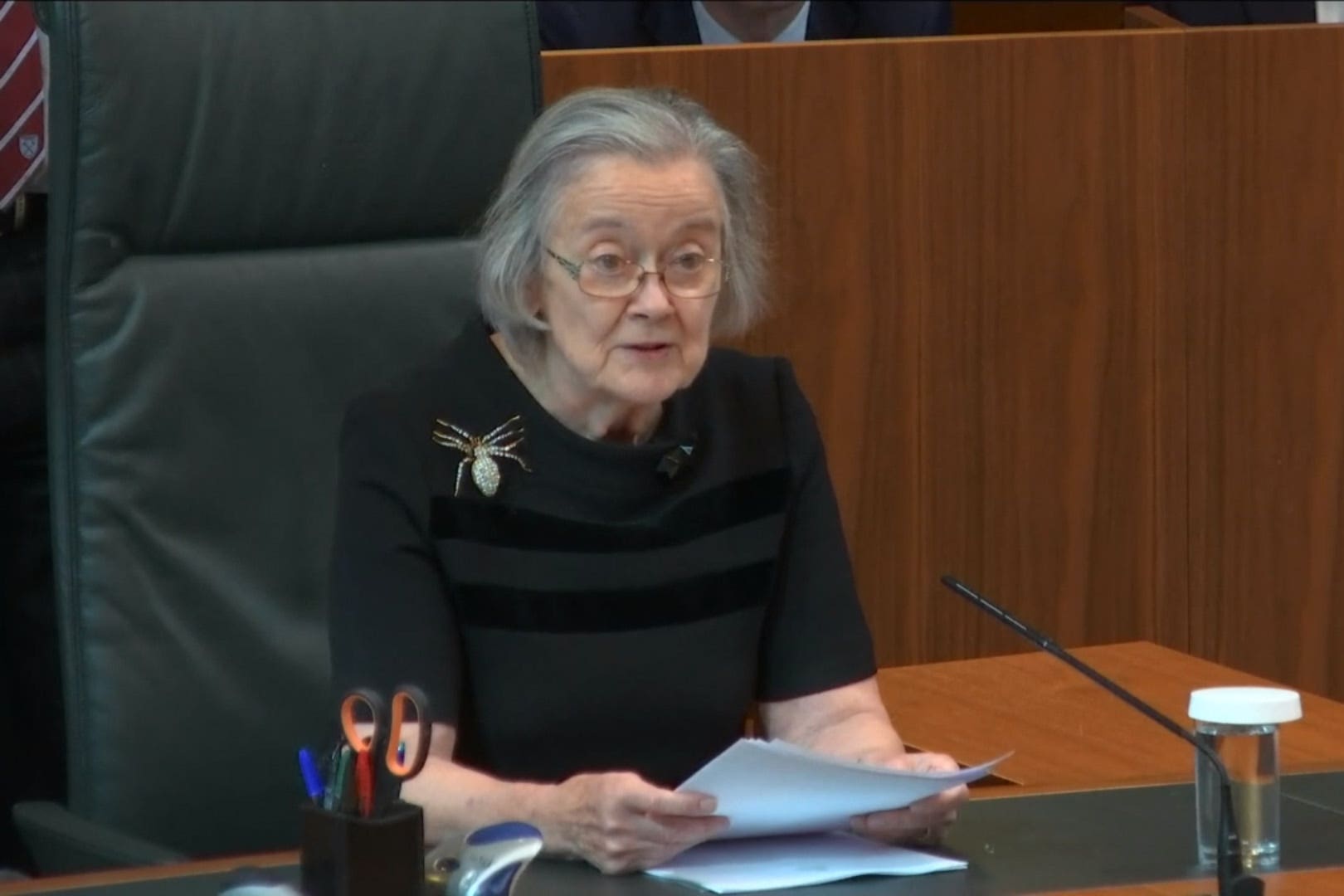Top judge Lady Hale gives first speech in Lords 20 years after accepting peerage
Lady Hale is a former president of the Supreme Court, who became known for finding Boris Johnson’s prorogation of Parliament in 2019 to be unlawful.

Your support helps us to tell the story
From reproductive rights to climate change to Big Tech, The Independent is on the ground when the story is developing. Whether it's investigating the financials of Elon Musk's pro-Trump PAC or producing our latest documentary, 'The A Word', which shines a light on the American women fighting for reproductive rights, we know how important it is to parse out the facts from the messaging.
At such a critical moment in US history, we need reporters on the ground. Your donation allows us to keep sending journalists to speak to both sides of the story.
The Independent is trusted by Americans across the entire political spectrum. And unlike many other quality news outlets, we choose not to lock Americans out of our reporting and analysis with paywalls. We believe quality journalism should be available to everyone, paid for by those who can afford it.
Your support makes all the difference.Top judge Baroness Hale of Richmond has delivered her maiden speech in the House of Lords nearly 20 years after accepting a peerage.
Lady Hale is a former president of the Supreme Court, who became known for declaring Boris Johnson’s prorogation of Parliament in 2019 to be unlawful – and for her now-famous spider brooch.
Wearing a large silver butterfly brooch for her speech, the independent crossbench peer apologised for taking so many years before speaking on the floor of the chamber.
First, my lords, I owe you an apology
Lady Hale said: “First, my lords, I owe you an apology. This is my maiden speech, yet I was sworn in as a member of this house as long ago as 12th January 2004.
“I am rushing to remedy the defect before the 20th anniversary. Please allow me to offer you an explanation, if not an excuse.”
The 78-year-old explained how, at the time of her appointment to the unelected house, she was known as a Lord of Appeal in Ordinary – or Law Lord.
Law Lords were judges appointed to the Lords, as a committee of the House, to exercise the judicial functions of the upper chamber, including acting as the highest appellate court in the land.
However, in 2009 the Supreme Court was created, the Lords lost its judicial function and the current Law Lords instead became the new Justices of the Supreme Court.
Lady Hale told peers: “I was sworn in to hold office as a Lord of Appeal in Ordinary, ‘so long as she shall well behave herself therein’.
“This caused much merriment on the day. It also caused some puzzlement to one of my guests – the Chief Justice of Alberta – because Lord Triesman, who was sworn in at the same time, did not have to promise to behave himself, although I’m sure he has.
“She wondered whether it is because I am a woman, but of course it was not. It was because I was a judge, and since the Act of Settlement of 1701, it has been a guarantee of judicial independence that we hold office during good behaviour, and not during His Majesty’s pleasure.
“I have tried throughout my judicial career to uphold the rule of law and the independence of the judiciary upon which it depends, and it is for that reason that I never made a maiden speech during the five and a half happy years that I spent in this House as a Law Lord.
“Your lordships were very friendly and welcoming, but I did think that we should be here. Making laws and holding the Government to account are constitutionally different functions from applying and interpreting the laws and adjudicating disputes.
“So, I was glad when we crossed the square to become the Supreme Court of the United Kingdom.
“This has, I believe, turned out to be a thoroughly good thing. It also meant that for more than 10 years I was disqualified from taking part in parliamentary business.”
Lady Hale became a High Court judge in 1994, a Lady Justice of Appeal in 1999, a Law Lord in 2004, a Justice of the Supreme Court in 2009, deputy president of the Supreme Court in 2013 and the first woman to be the president of the Supreme Court in 2017, before retiring in 2020.
Her apology came as peers debated the current state of mental health support for children and young people in England.
Liberal Democrat peer Earl Russell, who moved the debate, opened up about his own daughter’s mental health struggles as he urged the Government to take action on this issue.
He revealed: “I have been moved to bring this debate, as I have personal experience of poor mental health and the impact it has on young people, following my own daughter’s five years of struggle.
“As a parent, this has been one of the most challenging periods of my life. No parent ever wants to see their child not able to keep themselves safe.
“It is important that we politicians share our personal experiences as part of the fight for change. I am proud of the progress she has made.”
Earl Russell, and as well other peers, expressed their disappointment that the Government did not include the long-awaited Mental Health Bill in the King’s Speech.